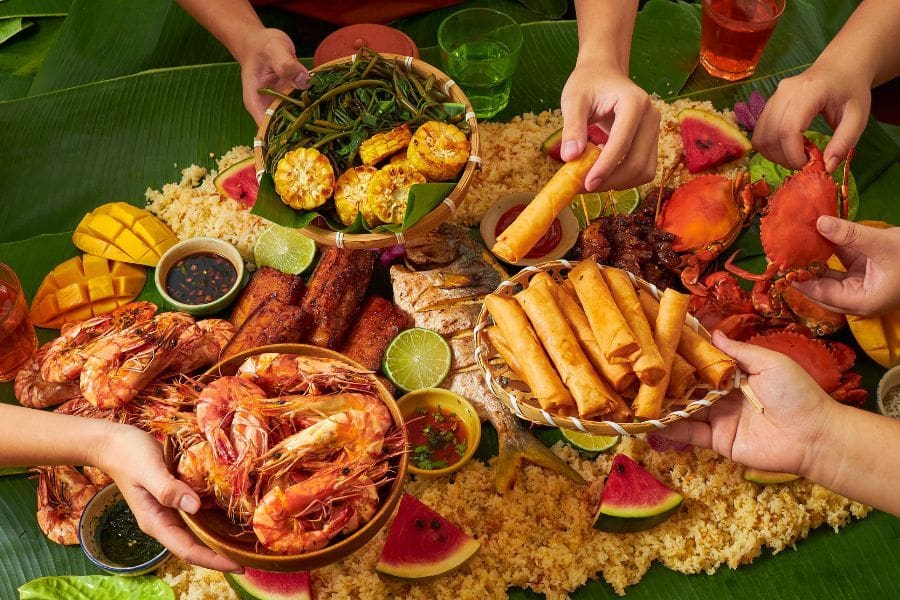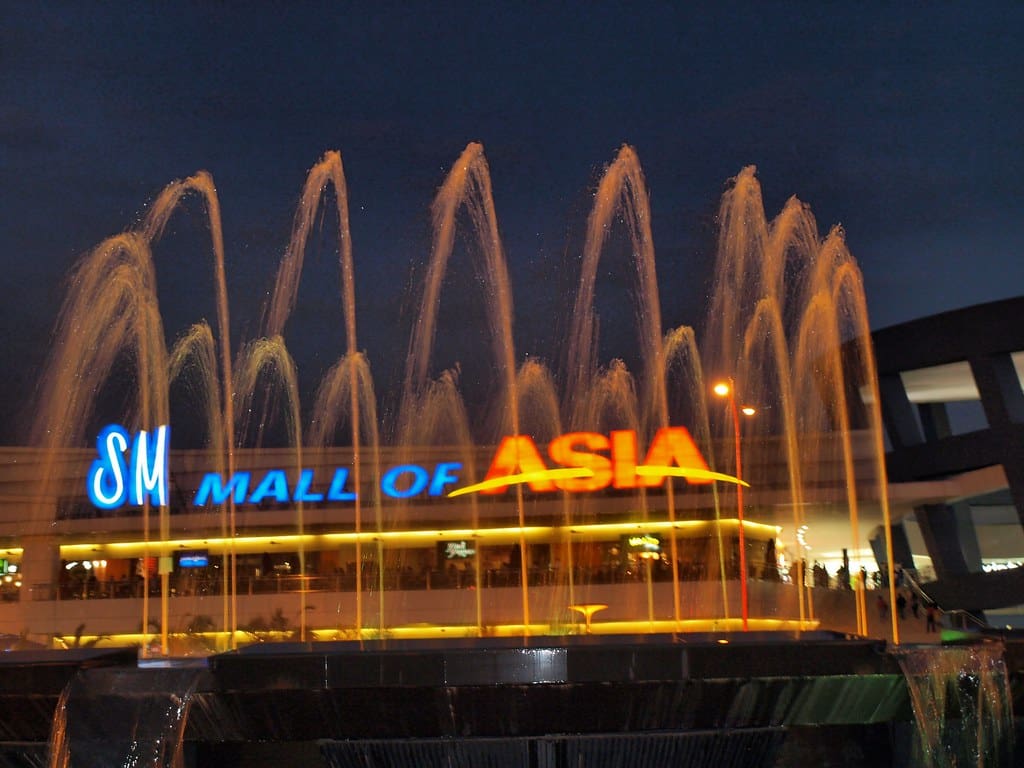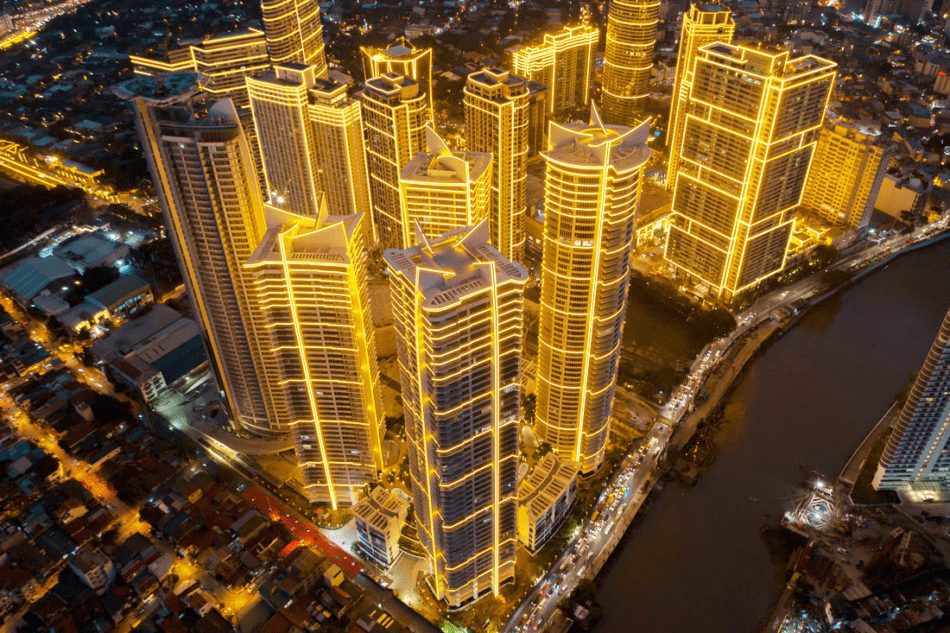Filipino culture is as vibrant as a fiesta and as layered as a perfectly made halo-halo, yet it’s often boxed into tired stereotypes and overgeneralized misconceptions. Whether it’s the so-called ‘Filipino Time’ or the idea that all Filipinos work as domestic helpers, these narratives miss the mark completely. In this article, we’re rolling up our sleeves to break down these prejudices, challenge the clichés, and shine a light on what truly defines the Filipino spirit—resilience, creativity, and boundless hospitality. Buckle up, because it’s time to set the record straight
20 Common Stereotypes About Filipinos and the Philippines (Debunked with Real Talk)
1. The Philippines: More Than a Third-World Label
The Reality:
The Philippines is often labeled as a third-world country stuck in the past, but this couldn’t be further from the truth. Major cities like NCR (National Capital Region), Davao, Cebu, Iloilo City, Clark City and others highlight a country that’s rapidly modernizing with state-of-the-art infrastructure, vibrant industries, and an innovative spirit. It’s a nation that blends modernity with traditional charm. It’s a modern country with traditional charm.
The Impact:
This outdated label dismisses the Philippines’ impressive growth and innovation. It fuels misconceptions, making outsiders miss out on seeing the nation as a dynamic and competitive global player.
Real Talk:
Don’t call it “third-world” until you’ve seen its skyscrapers, tech hubs, and luxury casinos. The Philippines isn’t catching up; it’s leading the charge. 💻🌆
2. Filipino Cuisine Is Bland
The Reality:
Sure, Filipino food doesn’t scream spice the way Thai or Indian cuisine does, but calling it “bland” is like saying pizza is just bread with sauce—it’s wildly inaccurate and deeply unfair. Filipino food is a mouthwatering fusion of Chinese, Spanish, Mexican, and American influences, with dozens of regional variations that keep it exciting. From adobo’s tangy goodness to the fiery kick of Bicol Express, there’s no shortage of bold flavors—if you’re brave enough to explore.The Impact:
This stereotype not only oversimplifies Filipino culture, but it also robs the cuisine of its rightful place in global gastronomy. Filipino dishes are an edible history lesson, reflecting centuries of trade, colonization, and resilience. Plus, who else could make vinegar and soy sauce the MVPs of flavor?Real Talk:
If you think Filipino food is bland, you’ve been eating it wrong—or worse, you’ve been sticking to “safe” choices. Try sinigang for a sour punch in the taste buds, or dig into kare-kare with bagoong for an umami overload. And let’s not forget the desserts: halo-halo is basically an edible party. So, before you dismiss it, take your palate on a Filipino food tour and prepare to be humbled.

3. The Philippines Is Just Beaches
The Reality: Sure, the beaches of Boracay and Palawan are world-famous, but have you explored the serene beauty of Bohol’s Chocolate Hills or surfed the epic waves of Siargao? These spots are just scratching the surface of what the Philippines has to offer.
In 2024, the Philippines welcomed approximately 5.95 million tourists, a 9.15% increase from 2023, though still 28% below pre-pandemic levels. Esquire Philippines
The Philippines is a heavyweight in the shopping mall arena, boasting approximately 4,692 malls nationwide.
SM Mall of Asia: Located in Pasay, this colossal complex covers a staggering 589,891 square meters, making it the sixth largest globally. Wikipedia
SM City North EDSA: Situated in Quezon City, this mall boasts a gross floor area of 497,213 square meters, securing its place among the world’s largest shopping centers. Wikipedia
The Impact: This oversimplification deters tourists from exploring the country’s rich history and diverse landscapes.
Real Talk: The Philippines isn’t just a travel destination—it’s an experience. From beaches to history, adventure, and shopping, it’s a one-stop-shop for unforgettable memories.
ALSO READ: Manila Bay: A Must-Visit Destination for Tourists

4. Filipinos Are Bad Drivers? Think Again
The Reality: Navigating Manila’s chaotic traffic is an Olympic-level skill, requiring split-second decision-making and unshakable patience. From weaving through jeepneys to dodging motorcycles, Filipinos turn chaos into an art form with incredible adaptability.
The Impact: This stereotype unfairly blames drivers for systemic traffic issues like inadequate infrastructure and inconsistent enforcement, overshadowing the skill it takes to navigate such conditions.
Real Talk: Let’s be honest: most foreigners couldn’t last five minutes on Manila’s roads without breaking a sweat. Surviving EDSA is like winning the driving Hunger Games. Filipinos are built different. 🚗🔥
5. Filipinos Have Poor English Skills
The Reality: The Philippines is the third-largest English-speaking country in the world. Enough said.
The Impact: This outdated stereotype dismisses the Philippines’ bilingual education system, which equips millions of Filipinos with proficiency in English. Beyond that, Filipinos excel in global industries like customer service, healthcare, and content creation—all of which demand strong communication skills.
Real Talk:
To those who think an accent defines intelligence: sit down and take notes. Speaking one language fluently doesn’t make you superior to someone who can juggle five (yes, this is personal—I’ve lived this). Laughing at someone’s pronunciation while being clueless about the intricacies of their multilingual mind? That’s not superiority—that’s ignorance.
And let’s not ignore the irony here: Australians are known globally for having a distinct accent, and yes, it gets roasted internationally too. So maybe we should all stop playing the “perfect accent” game and start focusing on what really matters: understanding each other. (I’ve had a few bad experiences with FEW individuals who made discriminatory remark about my pronunciation. These incidents don’t define all Australians —just those specific people).
NOTES: No one should be judged or mocked based on how they speak. Instead, we should all focus on mutual understanding, which is far more important than any notion of a “perfect accent.”

6. Filipino People are Warm and Friendly
The Reality:
Absolutely, let’s keep it real. Filipino culture is built on hospitality, and most Filipinos are warm, friendly, and welcoming. They’ll strike up a conversation with strangers, share stories about their hometown, and even invite you to a meal at their home. But let’s not sugarcoat it—there are unfriendly folks and even scammers, just like anywhere else. Overall, though, Filipinos take pride in their hospitality, and it’s no surprise the Philippines was ranked 8th globally and 1st in Asia in HSBC’s “Expat Explorer Survey” for the world’s friendliest countries. Asia Society
The Impact: This stereotype, while mostly true, can sometimes lead to unrealistic expectations. Filipinos are human—they have bad days, too. That said, their natural warmth is one of the reasons tourists and expats fall in love with the country. It’s more than a cultural trait; it’s a deeply rooted value that showcases the essence of Filipino culture.
Real Talk: Smiling doesn’t mean everything’s fine; it means they’re strong enough to keep going. When it comes to genuine hospitality, Filipinos are unmatched. They’ll welcome you with a smile even when it’s 35°C and they’re sweating bullets. Don’t take advantage of their kindness, though—just enjoy it and say “Salamat!”
7. Filipinas are Quiet and Submissive
The Reality:
Submissive? LOL, Who Told You That? Quite? OMG! If you think Filipinas are quiet and submissive, you’ve clearly never met one. Sure, they might play it cool when they’re single and trying to impress, but once they’ve got the home they’ve worked hard for, it’s game over. Filipino women are the undisputed queens of the household, and let’s be honest—most husbands are happily under their command. Forget the stereotype; Filipino culture celebrates strong women who balance tradition with fierce independence.The Impact:
This stereotype undermines the strength, leadership, and influence Filipinas bring to their families, communities, and careers. It’s outdated, over-simplistic, and frankly, laughable.Real Talk:
Thinking Filipinas are submissive is like expecting a cat to fetch your slippers—not gonna happen, my friend. Yes, we’re sweet, polite, and friendly—until you cross the line. Mess with a Filipina, and you’ll find out she’s got the grace of a diplomat and the firepower of a military drill sergeant. And before you confuse kindness for weakness, let’s be clear: we’re not submitting; we’re strategizing. While I see myself as someone who plays the long game, other Filipinas may have their own way of showing strength. Either way, underestimating us isn’t a smart move
8. Filipinos Live in Poverty
The Reality:
Nope, not everyone in the Philippines is poor—let’s get that straight. Sure, 21.6% of the population lives below the national poverty line, with rural areas feeling it more (36%) compared to urban areas (13%). But let’s not paint the entire country with a single poverty brush. The Philippines has billionaires, a growing middle class, and thriving urban centers where people sip overpriced coffee while working on their MacBooks. Poverty is a real issue, but the nation has come a long way compared to 20 years ago.The Impact:
This stereotype unfairly diminishes Filipino culture by focusing solely on economic struggles, ignoring its progress and potential. Yes, poverty exists, but this one-dimensional view erases the resilience, resourcefulness, and ambition of Filipinos who continue to rise above challenges.Real Talk:
Spoiler alert: The reality is nuanced. Sure, some people struggle, but others are out there living it up in penthouses, driving luxury cars, and posting beach selfies on Instagram. So, before you throw that “everyone is poor” line around, maybe take a seat and learn a little nuance.

9. Filipinos are Overly Religious
The Reality:
While religion is central to many Filipinos’ lives, the country is not a monolithic Catholic nation. It hosts a vibrant mix of faiths, including Protestantism, Islam (particularly in Mindanao), indigenous beliefs, and even secular movements. This diversity reflects the adaptability and openness of Filipino spirituality.
The Impact:
The “overly religious” stereotype oversimplifies the Philippines’ spiritual landscape and dismisses the inclusivity and harmony among its diverse communities of faith.
Real Talk:
Faith is personal—don’t make it a one-size-fits-all thing. 🙏🌍

10. Filipinos Are Always Late
The Reality:
“Filipino Time” might have some truth in casual gatherings, but it’s not the whole story. Filipinos are notorious for arriving fashionably late to social events, but let’s be honest—this isn’t unique to the Philippines. When it comes to work, business, or professional settings, Filipinos are some of the most punctual and reliable people you’ll ever meet.
The Impact:
This stereotype paints Filipinos as disorganized and unprofessional, overshadowing the countless Filipinos who work hard to maintain discipline and punctuality, especially in competitive environments abroad. It also trivializes the deeply rooted Filipino culture of valuing relationships over rigid schedules—because to Filipinos, being fully present in the moment matters more than just beating the clock.
Real Talk:
Blaming “Filipino Time” for everything is like blaming traffic when you’re late—you’re just making excuses. Sure, some people push their luck (and clocks), but let’s not act like Filipinos have a monopoly on tardiness. Here’s a tip: tell us to arrive at 4 PM if the event starts at 5 PM—problem solved. But in work or formal settings? Filipinos don’t just show up on time—they show up ready to get things done. So, before you throw shade, ask yourself: is it “Filipino Time,” or are you just being too uptight?
11. Filipinas are All Beautiful?
The Reality:
Don’t Let the Crown Fool You. Yes, Filipinas are undeniably stunning—just look at the photo above of Miss Universe Philippines winners slaying year after year like it’s their birthright. But let’s not get carried away thinking every Filipina is walking around with a sash and crown. Beauty is subjective, and while many Filipinas can make heads turn well into their golden years, their real allure isn’t just skin-deep. Their charm lies in their wit, resilience, and that trademark Filipino warmth that’s as radiant as their smiles.
The Impact:
This flattering stereotype may boost egos, but it reduces Filipinas to their looks, overlooking their intelligence, creativity, and ability to roast you faster than a lechon at a fiesta. Filipino culture celebrates beauty, but it’s the strength and substance behind those looks that truly shine.
Real Talk:
Thinking every Filipina is a beauty queen is like assuming every Aussie surfs or every Italian makes perfect pasta—it’s flattering but far from the whole story. Sure, Filipinas are gorgeous, but don’t let their beauty distract you from the sharp minds and bold personalities behind those dazzling smiles. Marry one, and you’ll learn fast: the beauty is just the appetizer—the main course is her brilliance, humor, and the occasional savage clapback when you step out of line.

12. Filipinos Are Not Hygienic
The Reality:
Excuse Me, What Now? Whoever came up with this myth has clearly never stepped foot in the Philippines during summer—or any day, really. Filipinos don’t just bathe; they commit to cleanliness like it’s a full-time job. With humidity levels that make your shirt stick to your back by 9 AM, most Filipinos shower at least twice a day—morning and night. And by “occasionally,” we mean “occasionally, we shower three times instead of two.”
Even in countries with winter (yes, even when it’s freezing outside), Filipinos still stick to their daily shower routine because, let’s face it, cleanliness is not seasonal. Personally? I shower every single day, brush my teeth three times a day, and keep refreshments gum on hand like it’s a lifeline. And if you’re lucky enough to catch a whiff, I’m probably rocking my Black Opium perfume. Hygiene isn’t just a habit; it’s a lifestyle, and I don’t compromise.
The Impact:
This stereotype not only gets Filipino culture wrong but also insults the dedication Filipinos have to staying fresh. It’s not just about smelling good; it’s about feeling good, especially in the tropical heat that feels like a sauna you didn’t sign up for.Real Talk:
Saying Filipinos aren’t hygienic is like saying fish don’t swim—it’s absurd. While some people are out there debating whether to shower every other day, Filipinos are doubling down on soap and shampoo before you’ve even brewed your coffee. So next time someone floats this ridiculous claim, kindly remind them: Filipinos don’t just stay clean—they set the global standard. And if you’re still not convinced, try standing in the Philippines heat for five minutes and see if you don’t feel the need for a shower. Good luck.
13. Some Filipinos are Lazy and Dependent
The Reality:
Hold Up. Let’s set the record straight: laziness has nothing to do with nationality—it’s human nature. You’ll find lazy and hardworking people in every corner of the world, and the Philippines is no exception. That said, give a Filipino the right opportunity, a fair working environment, and proper compensation, and you’ll see them hustle like their lives depend on it (because often, it does). Now, does the country have its share of idle folks? Sure. But before you judge, take a moment to consider the lack of well-paying jobs and opportunities that force some people into survival mode. Blaming Filipinos for laziness without understanding the systemic issues at play is like blaming your Wi-Fi for not working when you haven’t paid the bill.
The Impact:
This stereotype undermines the resilience and resourcefulness that define Filipino culture. Filipinos are some of the most hardworking people globally, proven by the millions who take on tough jobs abroad to provide for their families. Reducing an entire nation to a lazy stereotype ignores the grit and grind that’s at the core of Filipino identity.
Real Talk:
Calling Filipinos lazy is not just wrong—it’s lazy thinking. Sure, you’ve got a few slackers (don’t we all?), but for every one of them, you’ve got a farmer up before dawn, a construction worker braving the midday heat, or an OFW working 12-hour shifts to send money back home. So before you throw around blanket statements, maybe put in the work to understand the challenges they face. Oh, and for the ones lying around all day waiting for opportunities to drop from the sky? They’re the exception, not the rule. Let’s not confuse a few bad apples with the whole orchard.
- Philippines Culture -
14. Filipinos Are Obsessed With Karaoke
The Reality:
Guilty as Charged (But There’s More to It). The thing is karaoke is practically a national sport in the Philippines. Put a mic in a Filipino’s hand, and you’re bound to hear a heartfelt rendition of “My Way” or “Dancing Queen” before the night is over. But let’s be real: it’s not just about singing. Karaoke is about bonding, blowing off steam, and proving once and for all that yes, we can hit that high note. And sure, some of us can’t carry a tune in a bucket (don’t look at me), but that’s never stopped anyone from belting out power ballads like they’re auditioning for “The Voice.”
The Impact:
This stereotype may seem harmless, but it reduces a deep part of Filipino culture to just a party trick. Karaoke isn’t just singing—it’s therapy, it’s connection, it’s our way of saying, “Hey, life’s tough, but at least we’ve got music (and sometimes a standing ovation from drunk uncles).” Plus, it ignores the fact that this love for music reflects our creativity and passion for the arts. We’re not just singing—we’re performing.
Real Talk:
Yes, we Filipinos love karaoke. But calling it an obsession? That’s like saying Italians are too into pasta—it’s not obsession, it’s culture. And if you’ve ever dared to challenge a Filipino in a karaoke battle, you know we don’t just sing; we feel every word. Don’t be surprised if I have my own mic at home (yes, it has a gold finish, thank you for asking) and a playlist ready to go. But if you think this is just about being loud and proud, think again—karaoke is where memories are made, where heartbreaks are healed, and where every off-key note becomes part of the charm. So, next time you hear us singing? Grab a mic or get out of the way.
15. Filipinos Are Domestic Helpers
- Philippines Culture -
The Reality:
Let’s set the record straight: Yes, many Filipinos work as domestic helpers abroad, and they do so with pride and excellence. But here’s the truth—Filipinos excel in every field imaginable: from CEOs and engineers to artists, scientists, and even NASA rocket scientists. Domestic work is just one of many paths they’ve taken in pursuit of better opportunities for their families.
The Impact:
This stereotype unfairly diminishes the resilience, skill, and ambition of millions of Filipinos. Overseas Filipino workers (OFWs) take on domestic jobs not out of limitation but out of their love for their families. The remittances they send home fuel economies, build homes, and fund education. Labeling Filipinos as “just domestic helpers” erases their incredible stories of grit and triumph.
Real Talk:
Filipinos wear many hats—domestic helpers, yes, but also leaders, innovators, and educators. Let’s not forget they’re running businesses, driving progress across industries, and shaping global cultures. Domestic helpers? Call them “global professionals,” because that’s what they are. Next stereotype, please!
16. Filipinos Are Obsessed with American Culture
The Reality:
More Like Selective Enthusiasts. Yes, Filipinos appreciate American pop culture—fast food, Hollywood, and all—but obsessed? Nah, we just know how to adapt. Blame it on the colonial history, but it’s not a blind obsession; it’s a clever blend. You’ll see Filipinos rocking Levis while eating a burger… paired with rice. It’s not about idolizing; it’s about making things our own (ever tried a Jollibee burger? That’s peak Filipino-American fusion).
The Impact:
This stereotype erases the pride Filipinos have in their own culture. Filipinos embrace global trends, but they keep the heart of Filipino culture alive—from festivals to music to cuisine.
Real Talk:
Obsessed? We just cherry-pick the good stuff. Sure, we love a Marvel movie, but catch us crying over a Filipino teleserye or vibing to OPM (Original Pilipino Music). If blending cultures was an Olympic sport, we’d be taking home the gold.
17. Filipinos Don’t Prioritize Mental Health
The Reality:
Mental health awareness in the Philippines is growing, with efforts to break the stigma and provide support. But let’s be clear: we don’t use mental health as an excuse or turn it into a melodrama.
The Impact :
Filipinos have endured colonization, hardships, and adversity, which shaped us to be adaptable and emotionally strong. We address mental health with respect and resilience, not with over-the-top dramatics or manipulative excuses.
Real Talk:
Talking about mental health is about seeking solutions, not attention. So, unlike those who overplay the card, Filipinos focus on action, not excuses. That’s the difference. 🧠💪
18. Filipinos Are Always Smiling
The Reality:
Even when struggling. Hell, yeah! Filipinos are known for their smiles, but it’s not because life is easy—it’s because resilience is baked into Filipino culture. Smiling through hardships doesn’t mean ignoring the pain; it’s a way of staying hopeful and showing strength. It’s the ultimate “fake it till you make it,” but with genuine warmth.
The Impact:
This stereotype can trivialize the real struggles Filipinos face daily, masking the systemic issues behind their challenges. It’s not just a “happy-go-lucky” attitude; it’s survival with style.
Real Talk:
Think of our smiles as battle armor. We smile because we’ve got bills to pay, family to feed, and problems to solve. You think it’s all sunshine? Try commuting in Metro Manila traffic. If we’re still smiling after that, it’s not fake—it’s legendary.

19. Filipinos Don’t Appreciate Education
The Reality:
Filipinos highly value education as a path to success, evident in their investment in schools and professional development. Education is deeply ingrained in Filipino culture as a means to uplift families and achieve social mobility. Parents often make significant sacrifices, working abroad or taking on multiple jobs, to ensure their children receive the best education possible.
The Impact:
This stereotype ignores the sacrifices families make to ensure their children have better opportunities.
Real Talk:
Education isn’t just valued—it’s a badge of honor in the Philippines. For Filipinos, learning is a family affair, and success is celebrated by the entire community. So, yes, Filipinos don’t just appreciate education—they prioritize it. Share stories, achievements, and traditions through blogs, vlogs, and social media. 📚🎓
- Philippines Culture -
20. Filipinos Are Always Partying
The Reality:
Yes, Filipinos love a good fiesta—it’s a celebration of faith, tradition, and community. But that doesn’t mean we’re partying all day, every day. A fiesta is more than just a party; it’s a meaningful cultural event where neighbors, friends, and families come together to celebrate life’s blessings.
The Impact:
This stereotype unfairly labels Filipinos as carefree partiers, ignoring the effort, hard work, and generosity involved in organizing these events. Fiestas are about unity, gratitude, and togetherness—not just fun and games.
Real Talk:
Sure, we enjoy a lechon-packed celebration, but let’s be real—we work just as hard as we celebrate. If you think it’s “too much,” maybe it’s because you weren’t invited to the best party in town. Your loss.
What’s Your Take on Filipino Culture?
Filipino culture is as vibrant and diverse as the people who live it, and these stereotypes barely scratch the surface. While some may hold a kernel of truth, they often overlook the depth, humor, and resilience that define the Filipino spirit. Now, it’s your turn to share!
- Have you encountered any of these stereotypes?
- Which ones surprised you the most?
- Got a personal story or experience about Filipino culture?
- What are the biggest stereotypes you’ve heard about Filipinos?
Share your thoughts and let’s set the record straight—because this conversation matters! And hey, if this blog made you smile or rethink a stereotype, share it with your friends—because busting myths is always more fun together!














It is appropriate time to make some plans for the future and it is time to be happy. I have read this post and if I could I wish to suggest you few interesting things or advice. Perhaps you can write next articles referring to this article. I wish to read even more things about it!
I don’t think the title of your article matches the content lol. Just kidding, mainly because I had some doubts after reading the article.
No matter if some one searches for his vital thing, so he/she wishes to be available that in detail, thus that thing is maintained over here.
Hello are using WordPress for your blog platform? I’m new to the blog world but I’m trying to get started and set up my own. Do you need any coding knowledge to make your own blog? Any help would be greatly appreciated!
Fantastic beat ! I would like to apprentice whilst you amend your website, how could i subscribe for a weblog web site? The account helped me a acceptable deal. I have been a little bit acquainted of this your broadcast offered shiny transparent concept
Thank you for the good writeup. It in fact was a amusement account it. Look advanced to more added agreeable from you! By the way, how can we communicate?
Hello! Someone in my Facebook group shared this site with us so I came to take a look. I’m definitely enjoying the information. I’m bookmarking and will be tweeting this to my followers! Fantastic blog and wonderful design and style.
Hey there! I know this is somewhat off topic but I was wondering which blog platform are you using for this website? I’m getting fed up of WordPress because I’ve had problems with hackers and I’m looking at alternatives for another platform. I would be fantastic if you could point me in the direction of a good platform.
Hi there! Quick question that’s totally off topic. Do you know how to make your site mobile friendly? My blog looks weird when viewing from my apple iphone. I’m trying to find a theme or plugin that might be able to resolve this problem. If you have any suggestions, please share. Appreciate it!
I have learn a few good stuff here. Definitely worth bookmarking for revisiting. I surprise how much effort you place to make this type of excellent informative site.
Howdy! I know this is kind of off topic but I was wondering if you knew where I could find a captcha plugin for my comment form? I’m using the same blog platform as yours and I’m having difficulty finding one? Thanks a lot!
Hi! This is my first visit to your blog! We are a collection of volunteers and starting a new project in a community in the same niche. Your blog provided us beneficial information to work on. You have done a marvellous job!